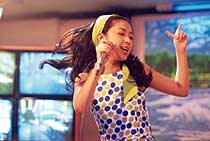The Korean peninsula may be a pretty unstable
place these days, but it looks like the much-heralded cinema
renaissance of the South may be settling in for the long haul.
Fears that the redoubled creative and box office strength of
South Korean film in the late ’90s might turn out to be a flash
in the pan are lessening. A large variety of movies continue
to come out and succeed with critics and audiences not just at
home but across Southeast Asia and at film festivals worldwide.
As they did last August, the New York-based grassroots collective
Korean Film Forum (KOFFO) is bringing a sampler case of eight
recent movies to BAM Rose Cinemas. "Secret Wonderland: The
Third Annual New York Korean Film Festival," culled from
a larger series running Aug. 15-21 at the Quad Cinema in Manhattan,
runs from Friday, Aug. 22, through Sunday, Aug. 24.
Given the quantity and quality of Korean films out there, it’s
some sort of marketing triumph that Nam Gee-Woong’s "Teenage
Hooker Becomes Killing Machine in Daehakno" (1999; screens
Aug. 22) is getting play on the fest circuit. Maybe it’s the
title, which makes this amateurish, tedious, semi-experimental
sci-fi-thriller featurette sound like more fun than it is (as
well as freeing critics from synopsizing the "story").
Nam might make a fine cinematographer based on the flashes of
visual poetry achieved here and there through the murk of digital
video, but the movie’s supposed "edginess" is strictly
undergrad film student stuff, right down to the randomly inserted
dance number.
Mercifully, "Teenage Hooker" is barely an hour long,
allowing KOFFO to fill out the time with two shorts that easily
outshine the feature. The anecdotal small-town character study
"Uncle Bar at the Barbershop" (2000) and the O. Henry-ish
mountain-climbing dark comedy "8849m" (2001) are refreshing
palate cleansers, blessed with a modesty and patience for nuance
that really show up Nam’s breastbeating excess.
Speaking of beatings and excess, "Jail Breakers" (2002;
Aug. 23) is the latest comedy of stubbornness from director Kim
Sang-Jin and screenwriter Park Jeong-Woo. It follows their patented,
box office-approved formula: a large cast of mule-headed characters,
criminal and otherwise, butt thick heads with each other and
the impersonal forces of fate, resulting in much hollering and
Three Stooges-style whacking, kicking, poking, pulling and gouging.
The chaos is catalyzed here by a pair of petty crooks who tunnel
out of prison only to discover that they have to break back in
the next day under the noses of a senatorial inspection delegation.
The louder-is-funnier aesthetic works about as well for me as
it did in their previous hits "Attack the Gas Station"
(1999) and "Kick the Moon" (2001) – that is to say,
erratically. Chuckles there are in good number, but the potential
of many amusing situations and characters remains untapped because
everyone reacts the same way to everything: contort your face,
scream yourself hoarse and strike someone. As usual, the supple
charm of their actors, even in this straitjacketed style, puts
Kim and Park’s dumb comedy a cut above most.
My mind wandered off on its own tangents several times during
Park Chan-Ok’s "Jealousy is My Middle Name" (2003;
Aug. 23). Which is not to say that it’s boring in the least,
but that moments, characters and snatches of dialogue kept sparking
associations and directing my memory down its own paths. You
generally have to go outside the United States for a movie like
this – a painstakingly (not to mention painfully) authentic slice
of regular life of the sort that Hollywood has never been too
interested in producing.
"Jealousy" centers around a young grad student who
rather masochistically takes a job at a magazine edited by the
older man who unknowingly stole his girlfriend. The two men develop
a curious relationship, which the protagonist allows to subtly
warp his other connections, the way a large object displaces
the water around it.
But Park never lets the same thing happen to her quietly moving
film, which maintains the amorphous shape of real lives glimpsed
through an open window, the "duel" at its center never
forcing it into melodrama.
There’s an arguably trickier balancing act between realism and
melodrama in the two films on offer from Lee Chang-Dong, widely
regarded as one of the current wave’s brightest rising talents.
Both start with none-too-bright young ne’er-do-wells who, alienated
from family and community, reach clumsily for something better
without being sure what that is.
Dong’s first feature "Green Fish" (1997; Aug. 24) takes
the basic shape of many a previous gangster drama: the aimless
protagonist falls in with an underworld surrogate clan where
he finds a sense of belonging that proves fleeting and illusory.
The film is solid even when it sticks a little too closely to
the standard outline, right down to the boss’ unhappy moll who
tempts the hapless newcomer. But in a number of passages, Lee
transcends the conventions through the subtlety and acuity of
his observational powers and his focus on character.
Credit is due also to the performance of soon-to-be superstar
Han Suk-Kyu, who pulls off the not inconsiderable feat of making
this passive, and frankly, stupid guy sympathetic and even appealing.
"Green Fish" is a striking enough debut that one wishes
to see Lee spread his wings more boldly.
So go see his third and latest, "Oasis" (2002; Aug.
23). Reduced to its essentials, the premise sticks in the throat:
reckless man-child Jong-Du returns from a prison sentence for
a fatal hit-and-run and falls for the victim’s cerebral palsy-stricken
daughter.
Wait, come back!
If you skip this movie, you miss two of the most staggering performances
in years. Actors who show off their chops by pretending to be
disabled may be a dime a dozen, but the technical virtuosity
of Moon So-Ri’s turn as the young woman, Gong-Ju, should awe
even the jaded. Far more importantly, she somehow conveys through
a fog of ticks the character’s humor and curiosity, as well as
her loneliness and anger.
This actress would dominate most films. But "Jail Breakers"
co-star Sol Kyung-Goo matches her in the only relatively less
difficult role of Jong-Du, a jittery lunkhead whose exasperating
heedlessness can turn to unintentional cruelty.
Most filmmakers would try to counteract audience resistance to
this pair by sugarcoating them – but Lee’s too smart and too
tough to allow more than the occasional whiff of sentimentality.
And he cares too much about his hero and heroine, too.
So will you.
NOTE: Not available for
review at press time were the youth romance "Madeleine"
(2003; Aug. 22), the less youthful and more bitter romance "Ardor"
(2002; Aug. 24) and the iconoclastic, um, road movie "Road
Movie" (2002; Aug. 24).
"Secret Wonderland: The Third Annual
New York Korean Film Festival" will run Aug. 22-24 at BAM
Rose Cinemas, 30 Lafayette Ave. at Ashland Place in Fort Greene.
Tickets are $10, $6 for seniors and children under 12. For schedule
and other information, call (718) 636-4100 or log on to www.bam.org
or www.koreanfilmforum.org.



















